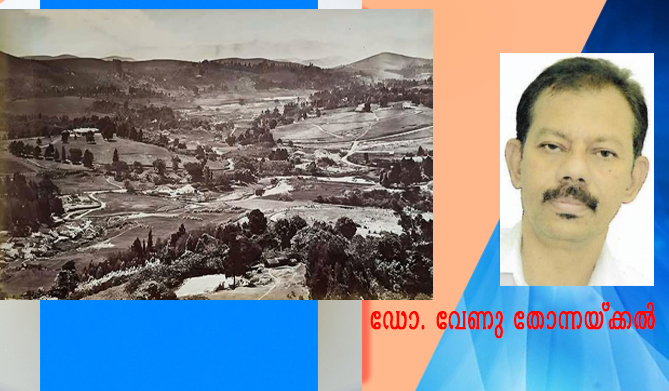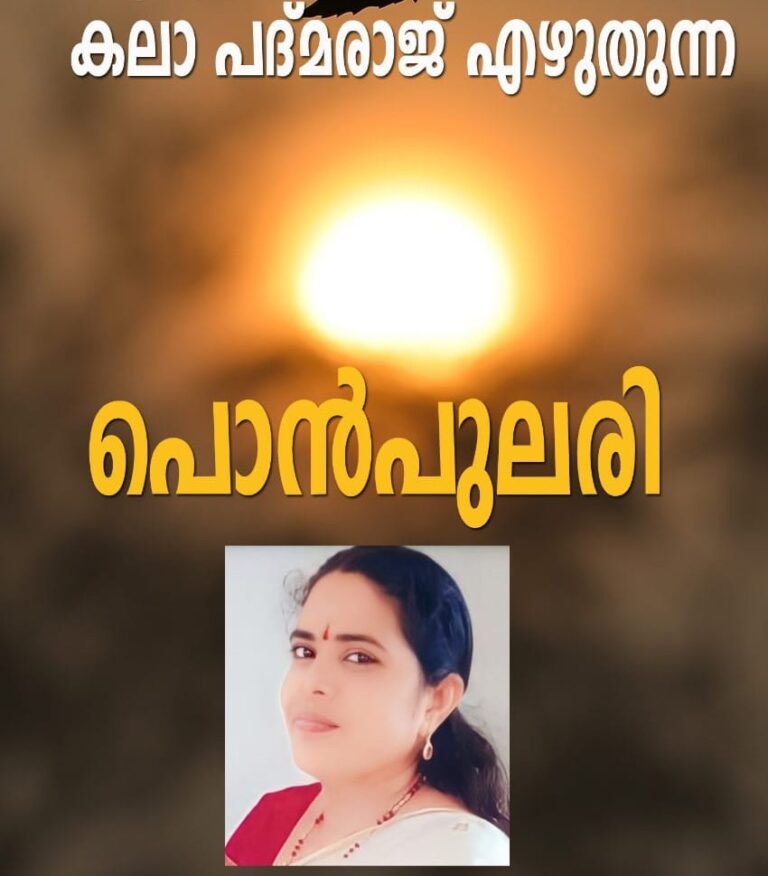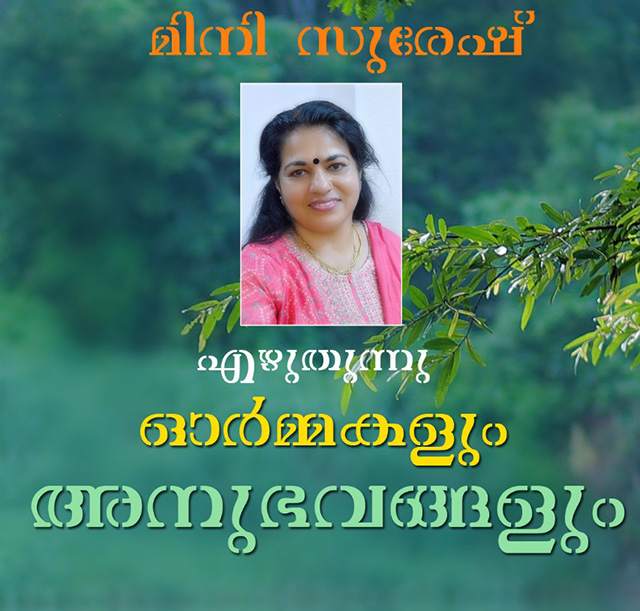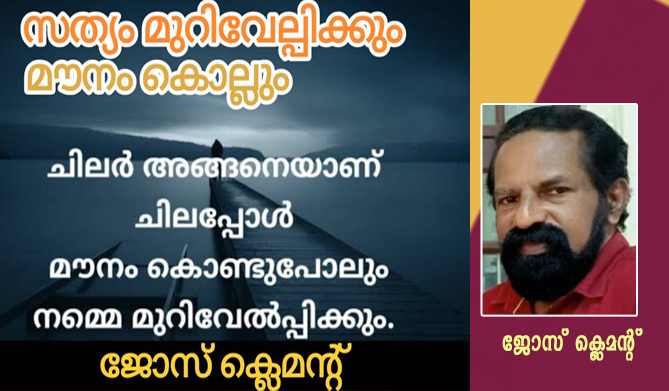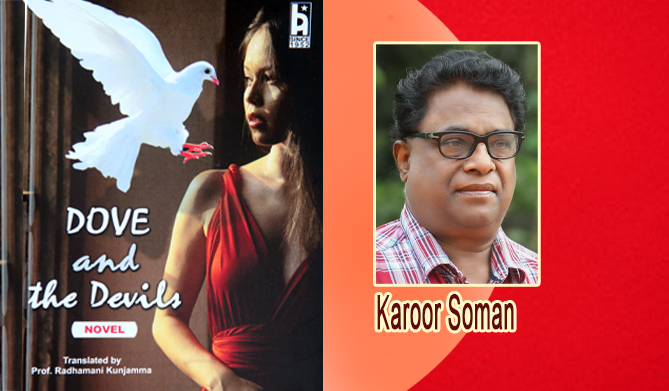Veloor: My Early Childhood Episodes
Veloor in Kottayam and Silent Valley in the High Rangesof Munnar do not have anything in common.
One is a coastal region and the other is a hilly area; one is lowland and the other is highland. But for me, it has certain things in common, which I will tell you in the course of my narration. Both are in Kerala, the southern state of India. One thing I will tell you in advance—both are my favourite spots; both are very near to my heart! Veloor has been a small place as far as I can remember. A beautiful place with rivers, streamlets, paddy fields, and coconut trees. Years back, when there were no buses on the route, we had to walk nearly three miles from the nearest bus stop. Once you get into the interior part of the village, it is the place that immediately you notice before the people catch your attention. As for the people, most of them used to be simple working-class people, the first generation working hard in the paddy fields, and the young having lots of fun indulging in fishing, playing native ball, etc. Women of the working class also worked in the paddy fields, assisting in farming in all its stages. Here were some people of middle, upper, and lower classes.
I don’t remember the place having any immensely rich people, as they probably might have settled in the more developed parts of Kerala. When you walk along the narrow pedestrian road winding beside the vast stretches of paddy fields, it offers a cooling vista of green land. Where there is no paddy field, there are small and big plots of land with mainly coconut lagoons, plantains, mango, tamarind, and other trees typical of the place. During the monsoons, the fields get flooded and they look like rivers, and sometimes small country boats do ferry where once roads were. The roads turn into streams and pools and we are unable to differentiate between the flooded fields and the overflowing rivers. Life becomes miserable and difficult for the inhabitants while it kindles the novelty and curiosity of the outsiders. In June and July, this place is isolated from the mainstream land because of heavy rains, and days and nights become heavily laden with chores like putting up things high from the floor level.
It is a sight to see the hens and the cocks, and even men perching on the roof. Some who have relatives elsewhere in much safer location shift their temporary stay to those places. While the inhabitants occasionally show frustration at the turn of the monsoon, it is great fun for the onlookers and the tourists. Almost every well-to-do family had country boats and boats were frequently used for transporting people and things, and for pastime for those who came to spend their vacation in Veloor when it did not have any heavy monsoon.
Only relatives and friends come to this place on important and other occasions. Even now, Veloor is not at all on the tourist map, and not many have known or given much thought about this small watery village. No wonder, people call such places as “Vellakuzhi” (flooded pit). Probably the place got its name from water; ‘Vel’ for ‘vellam’ meaning water; ‘oor’ for a place.) It was in one such place, Veloor, that a very important person in my life was born. That was my father whom we children called “Appachen”, and my mother(Ammcachy) referred to him in the style of those days as wives did not call their husbands by name: “ Pillerude Appachen”(Children’s father). Or, if any of the children were beside her, immediately Ammachy would name one of their names as the possessive case before the word ‘Appachen’.(for example, Omanayude Appachen, ie, Omana’s father) Despite her love for her husband, and hard work to sustain the family in every way, I’ve heard her lament off and on about how she was brought in marriage to a person in such a flooded pit.
Because she belonged to a place mostly of the firm sturdy land where there is not even the remotest threat of a flood. She was the daughter of one of the landed gentries, while Appachen’s family did not have much by way of land or money. Well, that situation has resulted from another incident which I will narrate later. Ever since I got the realization, I had known that my Appachen’s ‘tharavadu’(family home) was in Veloor and Appachen’s younger brother and family lived there.
The house was surrounded by paddy fields on three sides when not in waters. When it was watery, there was fun in going down the flight of steps to the ‘kadavu’ or the bank on the western side of the house, or to cross to the small stretch of land on the opposite side which belonged to my father, or to go boating. Another fascinating sight was that of the ducks that moved in a disciplined stream of line. I have often wondered how orderly the ducks are, quite unlike the hens and cocks. How unruly and indisciplined the hens and the cocks are! They can never be brought into an array or a line. Incidentally, one of my childhood wishes remains unfulfilled, which is to collect the eggs of the ducks directly from the field covered in mud and slush.
Perhaps the first person I remember having met in Appachen’s family home was not a member of the family, but an outsider, who was said to have come to the place long back, nobody knows exactly how, and whom we affectionately used to call “Chennimmumma”(Granny Chenni). Chennichedathy, that was what the elders called her or simply ‘Chenni.’ Nobody knew much about her.
I was very fond of her, and I think, she had a special affection for me, though her first affection always flowed towards Appachen’s brother’s family, especially the children Rajan, Renji, and Roshini, she stayed with. We were not frequent in our visit to Veloor as we lived in a place called Puthenangady some three miles away from Veloor. The moment we stepped into the courtyard, the first greeting would come from Chennimmumma in the form of a scolding or a complaint. “Oho, you are coming now? Do you know the way? Isn’t this your family home? Do you have any thoughts about this home and the people here? Bla…bla…bla..” This volley of abuses came, of course, out of her affection for us. Now I understand. But at that time I used to feel hurt initially, though it always ended in a patch up out of our mutual fondness.
We called Appachen’s brother “Appappen”(Uncle). His family consisted of his wife, our beloved “Ammai”(Aunt), their three children—two boys and one girl. The first boy, Rajan was a few years younger than me, and I remember carrying him on my back and going round and round the house singing the crude rustic song: “Chakkarakuttane veno, Pancharakuttane veno…?”(Do you want a sweet jaggery mon? Do you want a sweet sugary mon?) Jaggery and sugary are terms of endearment we use when we cajole babies and infants. ‘Mon’ is for the word son. I would be asking my elder siblings, often with an ‘indecent’ additional refrain: “Theetakochine veno?…”(Do you need a boy of fetid?) I don’t know how I got this play song. It was very much in the rustic lore. I think I was only five or six at that time.
I was closest to my brother immediately elder to me. He was three years older than me and in all my childhood play we were together, though sometimes we had our cousins with us. I remember having gone by a small country boat with my older siblings. What fun it was to go round and round the house in the field which was covered with water on all sides except on one side! Before I could enjoy my Veloor life fully we had moved to Puthenangady—that’s what Ammachy told me when I grew up. One main reason was, she said, I was about to be drowned two or three times in the Kadavu at the western side of the house. I don’t remember. I was too young to remember these things. Once it was Ammachy who saved me. I had the habit of taking my elder sisters’ ribbons to wash in the Kadavu, once they left for their school( I heard the story much later). Then I slipped into the water which was too deep for me. Seeing this Chennimmumma jumped into the water, but the heaviness of the concern and anxiety she felt, left her numbed, and she froze in the water. She had shouted “Ayyo…Ayyo…” before jumping into the water and the cry and the alarm brought Ammachy who was in the kitchen to the bank or the Kadavu.
Though Ammachy had not learned any swimming she jumped into the water and lifted me. It’s said, I was frightened and I cried aloud, and Appappen who came there at that time beat me to relieve me of my fear, as it was customarily believed that beating was good to relieve a child of its fear when it happened as a shock.
Another memory I had during those days was that of my Pallom Kochamma(my father’s younger sister)giving me lessons in swimming. I think I learned it only one day by clutching to the stem of the plantain, and so, I couldn’t acquire that skill. Pallom is a place some sixteen miles away from Veloor where Kochamma lived with her husband. We used to call her ‘Pallathe Kochamma’ meaning the aunty in Pallom, mainly to distinguish her from the other aunty, or rather other aunties both on our paternal and maternal sides. She was to be the most influential person later in my life. I got my name from her, though my godmother was her elder sister Illickale Kochamma, ie.,Kochamma in Illickal. Illickal is another place near Veloor, by the River Meenachil and she with her family lived there. Once we settled in Puthenangady-house, as I mentioned earlier, we used to visit our Uncle, Aunt—Appappen and Ammamma, and children, and we spent many happy hours together. My Aunt was a very loving person and a role model. We all loved and admired her.
You can see, my love for Veloor rests purely on the natural, uncorrupted beauty of the place with its rivers, streamlets, paddy fields, coconut trees, etc., and the association of the place with some of my beloved persons. Though I didn’t live there with my parents and siblings for long, the place has enough resources for me to feel nostalgia for it, as probably it is linked with my parents’ and siblings’ life there. However, Veloor is going to be significant not only to our family but also to the people of Kerala. You know the reason why…It is because of the flood in ‘99, which has been frequently referred to as a devastating incident down through the generations. People of all generations have stories to tell of the flood and its aftermath.
(Cont’d)


